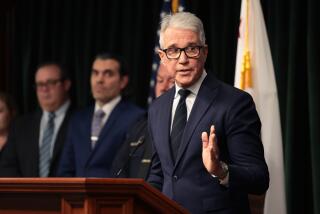Firm Settles FTC Lawsuit Involving Cable-TV Permits
- Share via
IRVINE — Metro Communications Group has settled a lawsuit with the Federal Trade Commission, which accused the company of misrepresenting the chances that its customers had to win potentially valuable wireless cable-TV licenses.
Metro Communications did not admit wrongdoing in the settlement but agreed to surrender $110,000 in assets that had been frozen by the FTC. It also agreed not to engage in such practices in the future.
The federal agency sued Metro Communications, an Irvine company also known as MMDS Technologies Inc., in January, accusing it and principals of misrepresenting the value of the services it offered to investors.
Officers for Metro Communications, which also has offices in San Diego, did not return calls for comment on Thursday.
Metro Communications provided services to help investors apply to the Federal Communications Commission for licenses to operate wireless cable-TV stations, which can use microwave radio transmissions to provide pay-TV services that compete with cable television monopolies.
But the FTC suit alleged that Metro exaggerated the chances of getting a license and minimized the multimillion-dollar costs of building a wireless cable-TV network.
The FCC, saying it was inundated with applications from questionable service firms, stopped accepting new applications for FCC wireless cable licenses in April. That move effectively shut down the application services companies, which typically charged $6,000 per application.
The FTC will use the frozen assets to pay for an FTC-appointed receiver who handled Metro Communications’ financial matters since the lawsuit was filed and for customer refunds, said Janice Charter, FTC regional director in Denver. Two Metro Communications principals, Gerald R. Foreman and James L. Smith, also settled FTC charges, as did MCG-San Bernardino, one of Metro’s dealers. Charges against two original defendants, Frank J. Draper and Stuart W. Weingarden, were dismissed.
Under the settlement, Metro Communications agreed to supply any future customers with a document outlining the risks of any investment and potential costs. Metro Communications also agreed, if it continues to solicit customers, to record conversations where potential customers are informed of the risks.
More to Read
The biggest entertainment stories
Get our big stories about Hollywood, film, television, music, arts, culture and more right in your inbox as soon as they publish.
You may occasionally receive promotional content from the Los Angeles Times.










